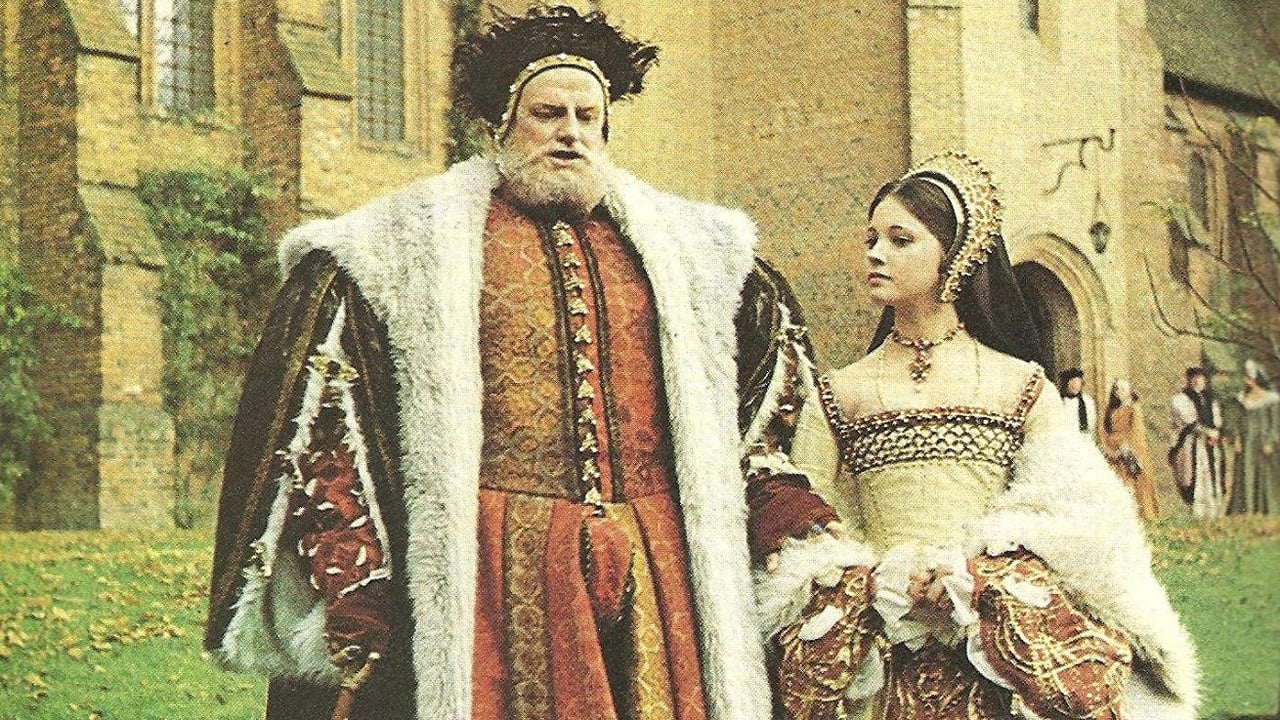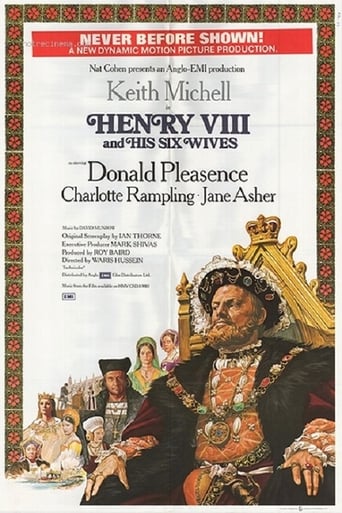

This is a film adaptation of the six part BBC TV series. I've unfortunately never seen the series but I know it is highly regarded, much more than this film version. The reason for the inferiority of this version is obvious: the original material is very compressed.It is naturally very difficult to compress a life so colourful, and containing so much complex political and abstruse religious manoeuvring as Henry's in a 2 hour film. Events rush by so much that it requires a good working knowledge of the life of Henry VIII to be able to follow them. For example Henry's relationship with Thomas More is barely established (it comes down to one 30 second conversation) before Thomas is executed. Later, we suddenly see rebels kneeling before Henry, for some under explained reason, who he immediately betrays (this is the Pilgrimage of Grace, when northerners rebelled against the king's abandonment of the Roman rite). Nor is the fall of Thomas Cromwell properly explored among many other lacunae. I wonder what the uninitiated would make of these things? Bewilderment I guess.The compressed nature of the film gives rise to much obvious expositional dialogue. Henry baldly states things rather than us subtly getting to know his thoughts through his actions. This violates the basic rule of drama "show not tell".Because of this the scenes of Henry's later life, when a lot of the political and religious turmoil had died down, come off better. There is simply less to explain to the audience and most of the famous historical people (Woolsey, More, Cromwell) were dead. So the personal drama can be explored more fully. The scenes with Katherine Howard are probably the highlight of the film, even if the actress rather over-eggs her final monologue. The scene with the king weeping is especially moving.I'm not sure if I could recommend this to a complete novice in Tudor history, it would be too confusing. But for those studying Henry's reign of general history buffs, it is moderately interesting.
... View MoreIf you haven't time to immerse yourself in the mini-series, then this two hour, compact 'preview' will give you a neatly constructed overview of the virile King and his exploits as he seeks to secure his lineage by conceiving a successor to his throne.Rather than condense aspects of the original mini-series (which essentially set aside one episode per wife, to put it crudely), this film version has been entirely remade. Only Michell reprises his title role, showcasing his intuitive interpretation of the rambunctious, though sometimes fragile majesty. Perhaps predictably, Charlotte Rampling's Anne Boleyn has the greatest exposure, though each of the wives acquit themselves well with the often limited dedicated screen time (the lovely Jane Asher playing the ill-fated Jane Seymour stands-out among the rest).Aussie actor Michell is a more vulnerable King Henry VIII than other memorable incarnations produced by Charles Laughton or Robert Shaw, displaying a deep-seeded personality conflict that while not unique to the character, is played with a more sympathetic tone and gesture.Hussein's ultra-light has its moments, although clearly it proves difficult to compress six marriages each with their own ulterior motives and intrigue into a mere two hour snapshot. For a preview, it's superb, though it's really no substitute for the mini-series time permitting.
... View More**WARNING SPOILERS - for those of you unaquainted with English history**This is an excellent period drama with a good cast including Donald Pleasence (Thomas Cromwell), Charlotte Rampling (Anne Boleyn), Jane Asher (Jane Seymour), Lynne Frederick (Catherine Howard), Michael Gough (the Duke of Norfolk) and Brian Blessed (the Duke of Suffolk) and an excellent portrayal of King Henry VIII by Keith Michell.Michell is very good as Henry VIII, portraying the King from his youth, married to the Spanish Katherine of Aragon, to his old age with the wife who would out-live him, Catherine Parr. Over this period of time Michell undergoes a serious transformation from an energetic young king to an immense gout-ridden old man. However, Michell's transformation is not merely cosmetic and he manages to change his voice, posture, bearing and the whole character of the king.The story charts the six marriages of King Henry VIII. First his marriage to Katherine of Aragon (Frances Cuka), mother of the future Queen Mary "the Bloody", for whom he had genuine affection but whose inability to conceive a son resulted in Henry's divorcing her and the King's historic break with the Catholic Church and their "Bishop of Rome".A slightly weightier Henry indulges in a passionate love affair with Anne Boleyn (Rampling), mother of the future Elizabeth I "the Virgin Queen", which ended with the King's paranoia placing her head beneath the executioner's axe. Henry then moves on to Jane Seymour (Asher), the only one of his wives that Henry seems to have genuinely and enduringly loved and may well have stayed with had she not died giving birth to Henry's only son, the future Edward VI.After Jane's death the King is persuaded by Thomas Cromwell (Pleasence) to marry again and chooses the German Anne of Cleves (Jenny Bos) on the basis of a rather too flattering picture - this portion of the film is surprisingly funny, as the much older and fatter Henry is visibly distressed by Anne's grotesque appearance.Perhaps one of the most touching parts of the film is the marriage between Henry and Catherine Howard, like Anne Boleyn, a relative of the Duke of Norfolk, who would follow her to the block, played exceptionally well by the late Lynne Frederick. Frederick is beautiful and so much younger than the extremely overweight Henry that it makes her obviously genuine affection for the old King all the more touching. Unlike Anne Boleyn, the King was forced, very much against his will, to have Catherine be-headed and the scene where the King bursts into tears in front of the entire Privy Council is very moving.The film closes with Henry on his death-bed, surrounded by many of the same advisers who had made his life so difficult (I rest easy in the knowledge that most of them were later executed by the King's formidable daughter, Elizabeth) and his last wife, Catherine Parr (Barbara Leigh-Hunt). This is a film of epic proportions and, although not as good as the B.B.C. series (also starring Michell), it is excellent and the costumes and setting are divine.The good thing about this film is that it shows Henry as more caring than he is usually portrayed and reveals how he was the victim of many visissitudes at the hands of his most loyal lieutenants, especially Norfolk, Cromwell, Cranmer (Bernard Hepton), Gardiner (Garfield Morgan) and Wolsey (John Bryans). Watch out for the brilliant scene where Donald Pleasence's Cromwell is de-frocked by the entire Privy Council - it's movie magic.7/10
... View MoreI thought this film was brilliant. The acting was so splendid it brought out each of Henry's wives as an individual woman, with the exception of Anne Of Cleves who appeared only twice and had a grand total of around three lines. Anne Boleyn was excellently played by Charlotte Rampling, and we really can believe that she is innocent of no crimes when she is sent to the block. Another standout is the late Lynne Frederick as Catherine Howard, as we see her fear, after her arrest. Knowing she will follow Anne Boleyn. We inthis marriage feel for king henry, as he thought he had found his perfect loving wife in Catherine Howard. In all i would say that this film is a must see, although it is slighty inaccurate. It also exaggerates, making Anne Boleyn hide numerous bodily deformations, while actually all she had was an extra lump of nail on her left small finger. But still see it!
... View More